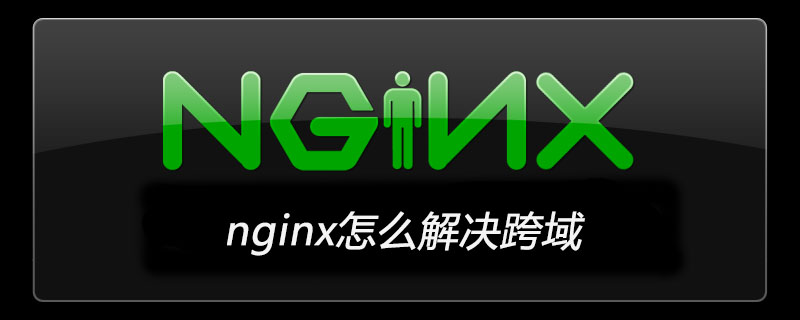Home >Operation and Maintenance >Nginx >How does nginx solve cross-domain issues?
How does nginx solve cross-domain issues?
- (*-*)浩Original
- 2019-11-01 11:06:4113899browse
这里,我们利用Nginx的反向代理功能解决跨域问题,至于,什么是Nginx的反向代理,大家就请自行百度或者谷歌吧。

nginx作为反向代理服务器,就是把http请求转发到另一个或者一些服务器上。通过把本地一个url前缀映射到要跨域访问的web服务器上,就可以实现跨域访问。 (推荐学习:nginx教程)
对于浏览器来说,访问的就是同源服务器上的一个url。而nginx通过检测url前缀,把http请求转发到后面真实的物理服务器。并通过rewrite命令把前缀再去掉。这样真实的服务器就可以正确处理请求,并且并不知道这个请求是来自代理服务器的。
具体解决方案如下:
在nginx.conf中编辑
server {
location / {
root html;
index index.html index.htm;
//允许cros跨域访问
add_header 'Access-Control-Allow-Origin' '*';
}
//自定义本地路径
location /apis {
rewrite ^.+apis/?(.*)$ /$1 break;
include uwsgi_params;
proxy_pass http://www.lyz.com;
}
}然后我把项目部署在nginx的html根目录下,在ajax调用时设置url从http://www.lyz.com/apistest/test变为/apis/apistest/test然后成功解决。
比如我之前请求的Ajax如下:
$.ajax({
type:"post",
dataType: "json",
data:{'parameter':JSON.stringify(data)},
url:"http://www.lyz.com/apistest/test",
async: flag,
beforeSend: function (xhr) {
xhr.setRequestHeader("Content-Type", submitType.Content_Type);
xhr.setRequestHeader("user-id", submitType.user_id);
xhr.setRequestHeader("role-type", submitType.role_type);
xhr.setRequestHeader("access-token", getAccessToken().token);
},
success:function(result, status, xhr){
}
,error:function (e) {
layerMsg('请求失败,请稍后再试')
}
});修改成如下的请求即可:
$.ajax({
type:"post",
dataType: "json",
data:{'parameter':JSON.stringify(data)},
url:"/apis/apistest/test",
async: flag,
beforeSend: function (xhr) {
xhr.setRequestHeader("Content-Type", submitType.Content_Type);
xhr.setRequestHeader("user-id", submitType.user_id);
xhr.setRequestHeader("role-type", submitType.role_type);
xhr.setRequestHeader("access-token", getAccessToken().token);
},
success:function(result, status, xhr){
}
,error:function (e) {
layerMsg('请求失败,请稍后再试')
}
});至此,问题解决。
The above is the detailed content of How does nginx solve cross-domain issues?. For more information, please follow other related articles on the PHP Chinese website!
Statement:
The content of this article is voluntarily contributed by netizens, and the copyright belongs to the original author. This site does not assume corresponding legal responsibility. If you find any content suspected of plagiarism or infringement, please contact admin@php.cn
Previous article:How to achieve nginx accessNext article:How to achieve nginx access

